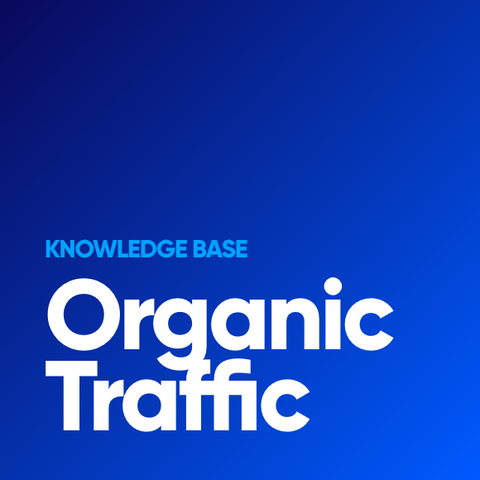The Lifeblood of the Web: Understanding Organic Traffic
Web traffic is the lifeblood that fuels the online world. It represents the visitors, users, and potential customers who navigate the vast landscape of the internet. Among the myriad ways to attract users to a website, organic traffic stands out as a prized and sustainable source. This comprehensive exploration delves into organic traffic, unveiling its significance, the methods to optimize it, and its profound impact on the digital landscape.
Unveiling Organic Traffic
Organic traffic refers to the users who arrive at a website through non-paid, natural search engine results. Unlike paid traffic generated through advertising campaigns, organic traffic is not directly influenced by financial investments. Instead, it is driven by the relevance and quality of a website's content, its search engine optimization (SEO) efforts, and user engagement.
The Role of Search Engines
Search engines are the gatekeepers of organic traffic. They index and rank web pages based on various factors, including keywords, content quality, backlinks, and user experience. When a user enters a search query, the search engine's algorithm determines the most relevant web pages from its index and presents them as organic search results. The user can then click on these results to access the web pages.
Understanding Keywords
Keywords are the essential building blocks of organic traffic. They are the words and phrases users enter into search engines to find information, products, or services. To attract organic traffic, websites must align their content with the keywords their target audience will likely use.
For instance, a website selling hiking gear may optimize its content for keywords like "best hiking boots" or "how to choose a backpack." When a user searches for these terms, the website's pages optimized for these keywords have a higher chance of appearing in the search results.
SEO: The Art of Organic Traffic Optimization
Search engine optimization (SEO) optimizes a website to improve its visibility in organic search results. Effective SEO strategies enhance a website's chances of ranking higher for relevant keywords. Critical elements of SEO include:
-
Keyword Research: Identify the keywords users search for and strategically incorporate them into the website's content.
-
On-Page Optimization: Enhancing individual pages by optimizing title tags, meta descriptions, headers, and other on-page elements.
-
Content Quality: Creating high-quality, informative, and engaging content that resonates with the target audience.
-
Link Building: Acquiring high-quality backlinks from other reputable websites.
-
Technical SEO: Ensuring a website is technically optimized for search engine crawling and indexing.
-
User Experience (UX): Improve page load speed, mobile-friendliness, and overall user experience.
User Intent and Engagement
Beyond keywords and SEO, understanding user intent is crucial for attracting and retaining organic traffic. Modern search algorithms aim to comprehend the meaning behind a user's query, not just the words they use. By delivering content that aligns with user intent, websites can engage visitors and keep them on their pages.
User engagement metrics, such as click-through rate (CTR), bounce rate, and time on page, provide insights into how users interact with a website. A high CTR indicates that users find the content relevant to their search, while a low bounce rate suggests that users explore the website further.
The Significance of Organic Traffic
Organic traffic is prized for several reasons, making it an integral component of any successful online presence:
Sustainability
Organic traffic is sustainable over the long term. Once a website achieves favorable search engine rankings for relevant keywords, it can continue to attract visitors without significant ongoing investments.
Credibility
Users often perceive organic search results as more credible and trustworthy than paid advertisements. High organic rankings signal to users that a website is an authoritative source in its niche.
Cost-Efficiency
While SEO efforts require an initial investment, the long-term cost of acquiring organic traffic is generally lower than paid traffic through advertising campaigns.
High-Quality Leads
Organic traffic tends to generate high-quality leads. When users find a website through a relevant search, they are more likely to be interested in its content, products, or services.
Competitive Edge
Websites that excel in SEO and attract organic traffic often have a competitive edge. They can establish themselves as industry leaders and capture a larger market share.
Long-Term Growth
Organic traffic contributes to a website's long-term growth and sustainability. As a website's content library expands and its SEO efforts continue, it can attract more users over time.
The Challenges of Attracting Organic Traffic
While organic traffic offers numerous advantages, it is not without its challenges:
Intense Competition
The digital landscape is highly competitive, with countless websites vying for top rankings. Achieving and maintaining a prominent organic presence requires overcoming fierce competition.
Algorithm Updates
Search engines continually update their algorithms to improve search results and combat manipulation. Algorithm updates can significantly impact website rankings, necessitating ongoing SEO efforts.
Keyword Saturation
Popular keywords may become saturated, making it more challenging for a website to rank for them. Websites often need to target long-tail keywords and use creative SEO strategies to stand out.
Content Quality
High-quality, engaging content is crucial for attracting and retaining organic traffic. Ensuring consistent content quality demands dedication and resources.
Technical Challenges
Technical aspects of SEO, such as website speed and mobile-friendliness, require ongoing maintenance to meet evolving standards and user expectations.
Strategies for Attracting Organic Traffic
To harness the power of organic traffic, websites employ a range of strategies:
1. Content Optimization
High-quality, informative, and engaging content is at the core of organic traffic. Websites should regularly produce content that addresses user needs, answers questions, and offers valuable insights.
2. Keyword Research and Targeting
Conducting thorough keyword research is essential for identifying the words and phrases users are searching for. Targeting relevant keywords in content, meta tags, and headings improves visibility in search results.
3. On-Page SEO
Optimizing individual web pages by fine-tuning elements like title tags, meta descriptions, headers, and image alt text increases their visibility and click-through rates in search results.
4. Backlink Building
Acquiring high-quality backlinks from reputable websites bolsters a website's authority and search engine rankings. Outreach, guest posting, and creating shareable content can help.
5. Technical SEO
Ensuring that a website is technically sound, with fast load times, mobile-friendliness, and efficient site architecture, is essential for search engines and user experience.
6. Mobile Optimization
The proliferation of mobile devices makes mobile optimization critical. Websites must ensure their content is easily accessible and navigable on smartphones and tablets.
7. User Experience Enhancement
Improving user experience through intuitive navigation, engaging multimedia, and fast load times keeps visitors on a website and encourages them to explore further.
8. Regular Updates
Websites that consistently update and expand their content libraries attract more organic traffic. Search engines favor fresh, relevant content.
9. Social Media Engagement
Social signals, such as likes, shares, and comments on social media platforms, can influence search engine rankings. Active engagement on social media helps drive organic traffic.
The Evolving Landscape
As the digital landscape continues to evolve, organic traffic remains a dynamic and ever-evolving aspect of the online world. Several trends are shaping the future of organic traffic:
1. User Intent-Centric SEO
Search engines are increasingly focusing on understanding and satisfying user intent. Content that aligns with what users are looking for will rank higher.
2. Voice Search Optimization
With the growing use of voice-activated devices, websites must optimize for voice searches, often natural language queries.
3. Featured Snippets
Featured snippets, or position zero, appear at the top of search results. Websites that secure featured snippets can experience significant increases in organic traffic.
4. Local SEO
Local search is vital to organic traffic, particularly for businesses serving specific geographic areas. Websites need to invest in local SEO to capture nearby audiences.
5. Core Web Vitals
Google's Core Web Vitals initiative prioritizes user experience by emphasizing page load speed, interactivity, and visual stability. Websites that meet these criteria will rank higher.
The Ongoing Quest for Organic Traffic
In the relentless quest for organic traffic, websites, and digital marketers navigate a landscape shaped by algorithms, user intent, content quality, and ever-changing SEO strategies. The significance of organic traffic as a sustainable, high-quality source of visitors cannot be overstated. As websites continue to vie for attention and visibility, they'll rely on SEO tactics, user-centered content, and adaptation to evolving digital trends to attract and retain the users who traverse the digital highways searching for information, solutions, and experiences.
Organic traffic is the foundation upon which many successful online ventures are built. It offers sustainability, credibility, cost-efficiency, and long-term growth pathways. However, harnessing organic traffic requires dedication, strategy, and the ability to adapt to an ever-changing digital landscape. By focusing on user intent, content quality, and the technical aspects of SEO, websites can secure their place in the digital spotlight, ensuring that users find what they seek and that the lifeblood of the web continues to flow.

Organic Traffic





